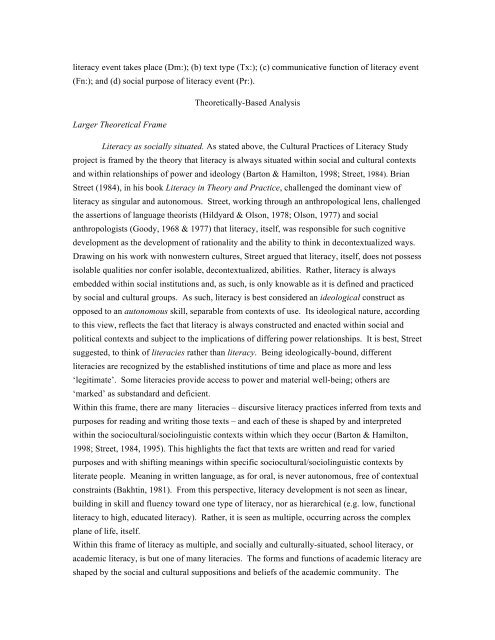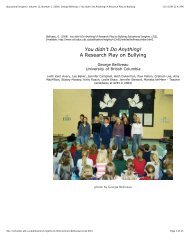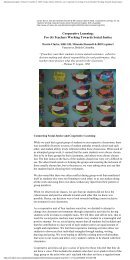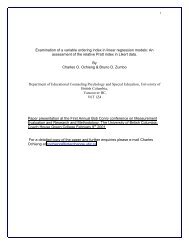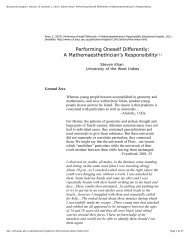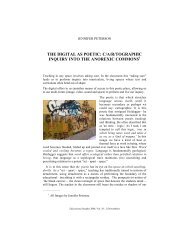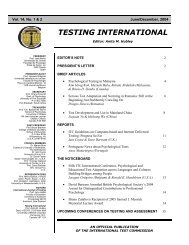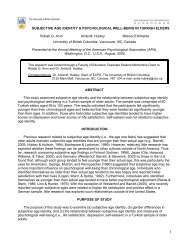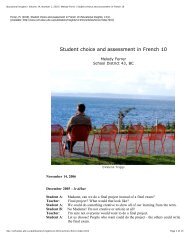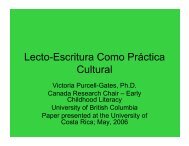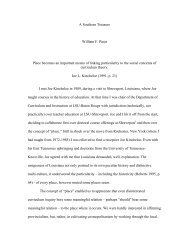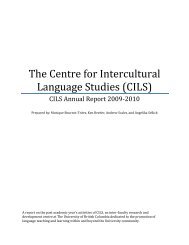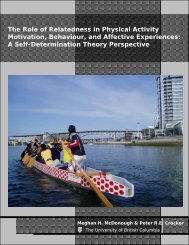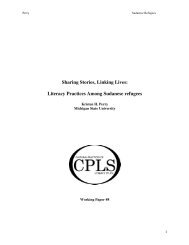Analyzing Literacy Practice - CPLS - University of British Columbia
Analyzing Literacy Practice - CPLS - University of British Columbia
Analyzing Literacy Practice - CPLS - University of British Columbia
Create successful ePaper yourself
Turn your PDF publications into a flip-book with our unique Google optimized e-Paper software.
literacy event takes place (Dm:); (b) text type (Tx:); (c) communicative function <strong>of</strong> literacy event<br />
(Fn:); and (d) social purpose <strong>of</strong> literacy event (Pr:).<br />
Larger Theoretical Frame<br />
Theoretically-Based Analysis<br />
<strong>Literacy</strong> as socially situated. As stated above, the Cultural <strong>Practice</strong>s <strong>of</strong> <strong>Literacy</strong> Study<br />
project is framed by the theory that literacy is always situated within social and cultural contexts<br />
and within relationships <strong>of</strong> power and ideology (Barton & Hamilton, 1998; Street, 1984). Brian<br />
Street (1984), in his book <strong>Literacy</strong> in Theory and <strong>Practice</strong>, challenged the dominant view <strong>of</strong><br />
literacy as singular and autonomous. Street, working through an anthropological lens, challenged<br />
the assertions <strong>of</strong> language theorists (Hildyard & Olson, 1978; Olson, 1977) and social<br />
anthropologists (Goody, 1968 & 1977) that literacy, itself, was responsible for such cognitive<br />
development as the development <strong>of</strong> rationality and the ability to think in decontextualized ways.<br />
Drawing on his work with nonwestern cultures, Street argued that literacy, itself, does not possess<br />
isolable qualities nor confer isolable, decontextualized, abilities. Rather, literacy is always<br />
embedded within social institutions and, as such, is only knowable as it is defined and practiced<br />
by social and cultural groups. As such, literacy is best considered an ideological construct as<br />
opposed to an autonomous skill, separable from contexts <strong>of</strong> use. Its ideological nature, according<br />
to this view, reflects the fact that literacy is always constructed and enacted within social and<br />
political contexts and subject to the implications <strong>of</strong> differing power relationships. It is best, Street<br />
suggested, to think <strong>of</strong> literacies rather than literacy. Being ideologically-bound, different<br />
literacies are recognized by the established institutions <strong>of</strong> time and place as more and less<br />
‘legitimate’. Some literacies provide access to power and material well-being; others are<br />
‘marked’ as substandard and deficient.<br />
Within this frame, there are many literacies – discursive literacy practices inferred from texts and<br />
purposes for reading and writing those texts – and each <strong>of</strong> these is shaped by and interpreted<br />
within the sociocultural/sociolinguistic contexts within which they occur (Barton & Hamilton,<br />
1998; Street, 1984, 1995). This highlights the fact that texts are written and read for varied<br />
purposes and with shifting meanings within specific sociocultural/sociolinguistic contexts by<br />
literate people. Meaning in written language, as for oral, is never autonomous, free <strong>of</strong> contextual<br />
constraints (Bakhtin, 1981). From this perspective, literacy development is not seen as linear,<br />
building in skill and fluency toward one type <strong>of</strong> literacy, nor as hierarchical (e.g. low, functional<br />
literacy to high, educated literacy). Rather, it is seen as multiple, occurring across the complex<br />
plane <strong>of</strong> life, itself.<br />
Within this frame <strong>of</strong> literacy as multiple, and socially and culturally-situated, school literacy, or<br />
academic literacy, is but one <strong>of</strong> many literacies. The forms and functions <strong>of</strong> academic literacy are<br />
shaped by the social and cultural suppositions and beliefs <strong>of</strong> the academic community. The


